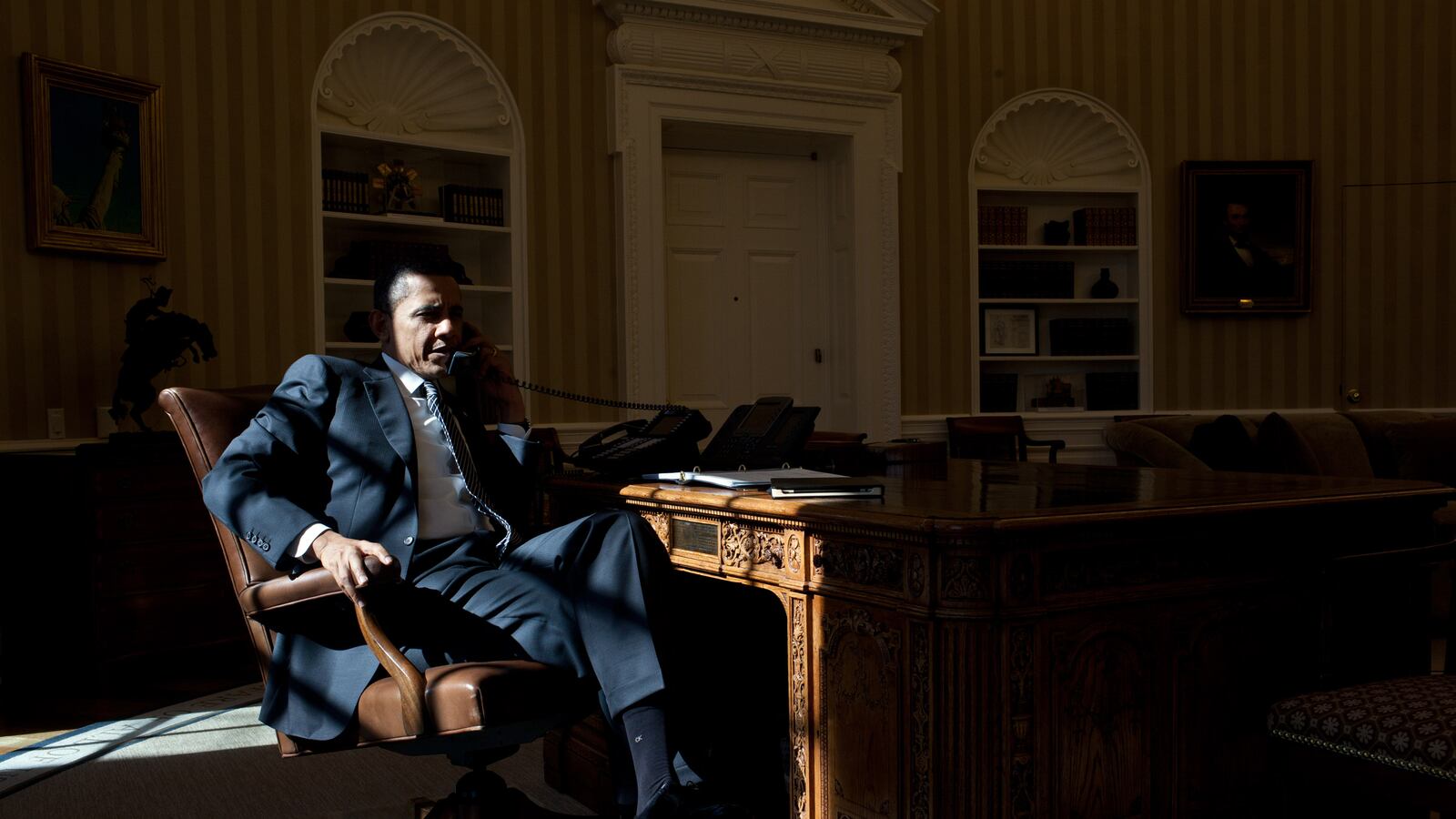President Obama may have to defy history—again. To pass much of his agenda for change, he not only will have to hold the Senate, but may have to gain the House in 2014, or come close, opening the way to what has eluded every two-term president in modern times—and at almost any time: a final two years of important, even historic, achievement in domestic affairs.

It’s a daunting challenge. Here’s why Obama may have to meet it—and here’s how he can.
Since the election, the Republicans have been dispensing a series of predictable speeches about rebranding. Following Louisiana Gov. Bobby Jindal, House Majority Leader Eric Cantor weighed in with his own call for a newer, better, and still, of course, conservative GOP. The rhetoric was mostly as empty of substance and evasive on details as a Paul Ryan budget. Indeed the whole exercise across the top ranks of the party is little more than an attempt to put lipstick on an elephant. Meanwhile, it’s plain to see that the elephant hasn’t done a backflip—or stepped even a few feet away from the rigidities of inaction and reaction.
House Republicans did decide, reluctantly, that they couldn’t afford to crater the full faith and credit of the United States or shut down the government. They’ve pulled back from the dubious and conspicuous tactic of crashing the economy. But they now claim they are ready to bleed it with the sequester—the automatic, across-the-board cuts that would depress growth this year to a pallid 1.4 percent. Unemployment would remain above 7.5 percent until 2015. House Speaker John Boehner denounced the president’s proposal to avoid the sequester before he actually announced it.
The Republicans may blink in the glare of public pressure, but a blinkered and unmanageable GOP House caucus may plunge right—far right—into the darkness.
On guns, Obama’s best possibility may be a universal background check. He’s just all but conceded the chances for measures like a ban on assault weapons and a limit on the size of bullet magazines. That doesn’t mean the president shouldn’t fight for them—or use them as a midterm electoral lever. It does mean that Boehner and company will do the work of the National Rifle Association and ignore their duty to the memory of Newtown’s children.
On immigration, Marco Rubio, Florida senator and almost certain U.S. presidential candidate, may be willing to countenance reform with a path to citizenship—at least until he confronts Tea-inebriated primary voters in 2015. Cantor, who’s tried so many times to apply concealer to the face of the GOP that he must have majored in cosmetology, praised Rubio in his latest makeover speech and endorsed the DREAM Act, which he’s previously voted against. But that act applies only to young people brought here as children—and would leave millions, including their parents, in the shadows. House Republicans are content with, even eager for, that. They’ve just held a hearing where they emphatically signaled that they favor a permanent legal status for “high-skilled workers,” a kind of limbo between illegality and citizenship that would introduce a form of apartheid to America.
So much for a refreshed Republican Party, which in fact still imbibes and spews the bitter waters of intolerance and exclusion. The House GOP blocks the renewal of the Violence Against Women Act and plots the defunding of Planned Parenthood. Republicans both there and in the Senate oppose equal rights for LGBT Americans. Republican governors and legislators conspire to suppress the vote of African-Americans, the young, and other minorities—to the democracy-shattering extreme of contemplating a gerrymander of the electoral votes for president so the loser can win. Add to this the party’s thirst for economic and social injustice. And in addition to stunting growth now with an austerity policy of sequestration, the GOP would exploit tax reform not to bring the budget gradually toward balance, but, surprise, surprise, to lower tax rates for corporations and the wealthy. Along the way, the GOP yearns to privatize and pulverize Medicare and Social Security.
I’d be happy if the House pursued something other than this dreary catalogue of discredited right-wing policies. But an institution whose public approval is lower than that of head lice—and even Donald Trump—will probably march to the angry drum of its fringe constituents, scorning the outcome of the 2012 election—where all these issues were debated—and the generally commanding support in poll after poll for the president’s positions. This could put the White House out of reach for the GOP in 2016, but House members shadowed by the specter of primary challenges may not care. As I’ve argued, it may take several national defeats for Republicans to come to their senses—and incline their appeal to a changing, more diverse America.
But what can and should Barack Obama do to secure his landmark objectives and assure that his final two years aren’t a token presidency in the domestic arena? He will have to invoke the full persuasive power of the bully pulpit—and sustain the full firepower of his vaunted political organization in 2014. In effect, he will have to run all out for a third term in the midterms.
Precedent is nearly uniformly against him, although JFK in the wake of the Cuban missile crisis saw Democrats gain four seats in the Senate—gaining nearly a two-thirds majority—while losing only four of their massive majority in the House. Similarly, under less fortunate circumstances, Bill Clinton’s party actually picked up five House seats in 1998. Democrats might have taken control then, if the president had had his way despite skittish party strategists, and advanced a decisive argument sooner than in the last two weeks: why are Republicans so obsessed with impeachment when the country wants Washington to focus on Social Security, education, the environment, and Medicare? I helped make the ads; it was too late for a sea change, but late enough to break the midterm jinx.
To confound the conventional, almost ominous predictions about 2014, Obama will have to articulate and amplify the narrative of his campaign last year. He will have to argue not intermittently but consistently that it’s time to do the country’s business and fulfill the voters’ mandate. He will have to say to them: You elected a president who’s on your side. Now will you elect a Congress on your side so we can move America forward? And he will have to be as totally engaged as he was in 2012.
He may have to explain why Republicans are responsible for a sluggish economic recovery. He will have to demand economic fairness. And if it doesn’t happen, he will have to insist day after day on real immigration reform. He will have to stand against the war on women. He can—and must—bring Hispanics, African-Americans, women, young people, and gays to the midterm polls in unexpected and unprecedented numbers. The changing contours of the American electorate shaped his triumph last fall. They are a demographic reality—but in November, the president and his state-of-the-art, ahead-of-the-arc campaign made certain that demography was destiny.
And that’s the heart of a second imperative. Yes, from the bully pulpit, Obama can provide air cover; he can even appeal to national-security voters by holding the GOP accountable for the indiscriminate slashing of the defense budget. But something more will be required. On the ground, Obama for America, now renamed Organizing for America, will have to wage a nonstop battle to reach and mobilize the sometime voters who can make the difference if they just turn out. If you receive the OFA emails, you are looking at the early signs of just such an effort.
House Democratic Leader Nancy Pelosi and campaign chair Steve Israel have identified the districts where Democrats can capture the 17 seats that will give them a majority. I was at a meeting last week where they made a convincing case that this was more than possible. Pelosi, the most effective speaker in memory, is now the most tireless campaigner and fundraiser. She did more than 600 events in the last two years—and will do 600 more in the midterm season. But she and the members of her party—in House contests and in vulnerable and winnable Senate seats, too—absolutely need the full weight of the Obama enterprise: social media, granular voter contact, and tailored messages that push and follow potential supporters all the way to the ballot box. Democrats also need a relentless, OFA-led movement to combat suppression and persuade voters to wait in long lines if they have to.
Finally, money matters—even if it couldn’t buy Mitt Romney and Karl Rove a win because they were so plainly out of touch and out of the mainstream. The president’s already agreed to 14 fundraising events for House and Senate Democrats this year—“an aggressive schedule,” according to one party official. There will be more such events. But there should be—and I think will be—a more intense offensive on a wider front. OFA should launch and fund a super PAC targeted on the most promising and perilous races—and designed as well to replace Republican governors and legislators in states like Michigan, Wisconsin, Ohio, Florida, and Pennsylvania.
No past president has ever pulled off something with the scope and impact of what I’m suggesting here. But Obama has already written singular chapters in American politics. In 2014, for the sake of his vision, his legacy, and the land he has twice been elected to lead, he may—and probably will—have to upend the settled order of things one more time.
He called last year his last campaign. He has another one in him. And that may decide whether his last two years, and even these two, are truly consequential and not just a case of counting down the days.






